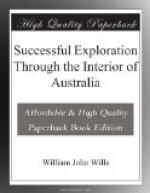The Darling Pea.—It appears to be a disputed question, even on the river, as to the effect of the Darling pea on horses, some asserting that they become cranky simply from eating that herb, and others that it is starvation that makes them mad. I could get no satisfactory information even as to the symptoms, which seem to vary considerably; but this I had from a reliable source, that horses will eat the pea in large quantities without being injuriously affected, provided they can obtain other food as well; but that when they are on portions of the river where they can get nothing else to eat, then they soon get an attack of madness.
Menindie to Scrope Ranges.—The country between Menindie and Kokriega, in the Scrope Ranges, a distance of thirty-six miles in a northerly direction, is a fine open tract of country, well grassed, but having no permanent water. At Kokriega there is a well which may be relied on for a small supply, but would be of no use in watering cattle in large numbers. The ranges are composed of ferruginous sandstone and quartz conglomerate, and as to vegetation are of a very uninviting aspect. The plain to the south is covered with quartz and sandstone pebbles. About five miles to the north-east of the Kokriega is a spot where the schist rock crops out from under the sandstone, and the rises here have somewhat of an auriferous character.
North of the Scrope Range.—To the north of the Scrope Range the country has much the same appearance, except that there are more trees, and no stones until one reaches the Mount Doubeny Ranges, a distance of nearly forty miles. At a spot half way, named Botoga, there are some flats well calculated for collecting and retaining rain water.
Mount Doubeny Range.—In this range there are, no doubt, many places where permanent water may be found in considerable quantities. Two places I may mention where the water is certainly permanent—Mutwongee, a gully midway between camps 39 and 40; and Bengora Creek, the latter camp.
Country North of Mount Doubeny.—From these ranges up to our present position we have passed over as good grazing country as one would wish to see; salt bushes of every kind, grass in abundance, and plenty of water. Amongst the ranges we found kangaroo grass as high as our shoulders, and on the plains the spear grass up to our knees.
Naudtherungee Creek.—At this creek, which takes its rise near Mount Lyell, and probably flows into the McFarlane’s Creek of Sturt, we found a small shallow pond of water, in the sandy bed of the creek. This did not look very promising, but on digging I found that the whole bed of the creek was a mass of loose sand, through which the water freely permeated, and that the waterhole we found was only a spot where, the level of the surface of the sand being below that of the water, the latter oozed through. I am informed by Mr. Wright, who was here in January last, that the creek contained much more water then than now.




